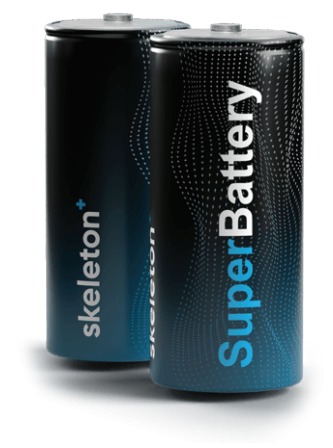The SuperBattery is the first non-supercapacitor product for Skeleton, a master of their field, and it fills the technology gap in the energy storage market between the <1- to 60-second application time for supercapacitors and the >15-minute application time of typical Li-ion batteries, with over ten times the amount of charge cycles for a much longer lifetime. The SuperBattery delivers peak power within seconds while excelling in up-to-30-minute applications.
Based on Skeleton’s patented Curved Graphene material, this new product is an innovative technology combining the characteristics of supercapacitors and batteries for the very best of both worlds: High power density, long cycle life, fast charge rate, and high inherent safety. With no thermal runaways and no need for thermal propagation measures, SuperBatteries are safe, even when pierced, crushed, or overheated.
The SuperBattery offers a maximum voltage of 3 V (nominal 2.25 V), 23 Ah capacity, 2 kA typical short-circuit current, and a stored energy of 51.8 Wh. Not your average battery, it can deliver a 10-second max. power of 4 kW or 1-second max. power of 8 kW. The first SuperBattery cells come in the supercapacitor industry standard D60 large cell form factor with a mass of 800 g, diameter of 60.2 mm, and length of 138.0 mm, excluding the terminals. With an operating temperature from -30°C to +50°C, these devices are able to serve the needs of many sectors and are currently being used and/or tested in hybrid and fuel cell EVs, buses, trucks, and charging infrastructure. In hard-to-abate sectors, such as mining and off-road, SuperBatteries can help eliminate 40-50% of carbon dioxide emissions, bringing these sectors closer to net-zero targets.
Which brings us to Skeleton’s next point. Unlike Li-ion batteries, the SuperBattery offers high recyclability and sustainability, since they don’t use cobalt, nickel, graphite, or copper. Skeleton claims their unique combination of materials allows for 100x faster charging compared to standard Li-ion batteries while offering excellent safety. Like them or not, even Shell is employing Skeleton’s technology as part of their decarbonisation strategy.
Skeleton have been offering high-power supercapacitors – from 300 to 5000 Farad – for years, but their SuperBattery seems like a very new product, and while I believe samples may be available, it is still on an enquiry basis regarding any related modules that one might use to test such a technology. In this eventuality, I have created an application form for entering into consultation with Skeleton rather than simply offering a sample, though this may indeed be the result of such a consultation.
Keep designing!
(Image sourced from Skeleton)

